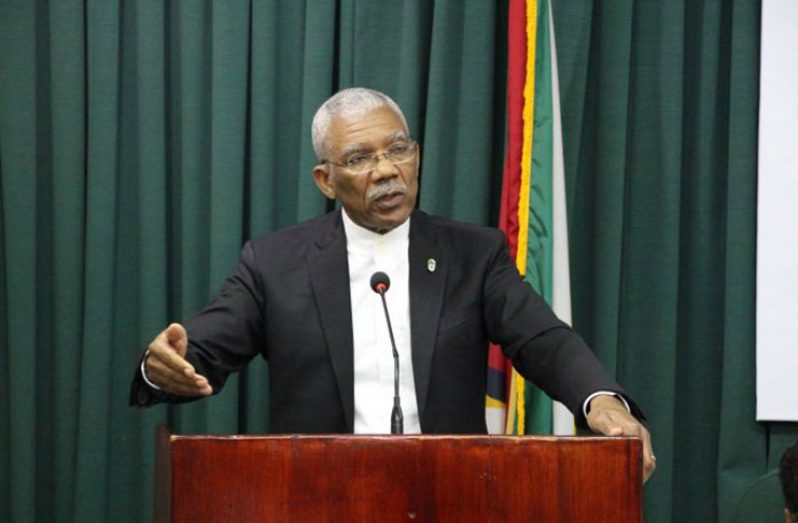– says commissioners should be appointed by National Assembly
President David Granger in endorsing calls for the Guyana Elections Commission (GECOM) to be reformed went one step further and added that Commissioners should be appointed by the National Assembly.
At a press conference at the Ministry of the Presidency on Friday, the President told reporters that the Carter Formula, which is in use, has “exhausted its usefulness.”
That formula, which is embedded in the Constitution, allows for the opposition leader, after consultation with other opposition parliamentary parties, to present the sitting President with a list of nominees from which he may choose one.
But last October, President Granger unanimously appointed retired High Court Judge, Justice James Patterson as chairman of the Guyana Elections Commission (GECOM) after considering the three lists of nominees submitted by the Opposition Leader, Bharrat Jagdeo as unacceptable within the meaning of the Constitution.
In addition to the chairman, the Constitution (Amendment) Act No. 2 of 2000 provides for the appointment of six members of the Commission – three members appointed by the President, acting in his own deliberate judgement; and three members appointed by the President acting on the advice of the leader of the opposition after he has meaningfully consulted the non-governmental opposition parties represented in the National Assembly.
“It is like having a cricket match with one umpire from each team. It is not a formula for consensus, it is a formula for gridlock,” President Granger said, while reiterating the need for reform.
He proposed that commissioners be appointed to the Elections Commission in a similar fashion to those appointed to serve on the Guyana Police Service Commission and the Public Service Commission. Those commissioners are nominated and recommended through a parliamentary process.
“I’m in favour of reform but we must adopt the architecture, we must adopt the procedures which are in place for other constitutional commissions,” the President said.
For decades now, the Elections Observer Groups from the Commonwealth, the Carter Center, the Organisation of American States, the Electoral Assistance Bureau, the Caricom Secretariat, and the Union of South American Nations have been insisting that while GECOM’s purpose for existence is to administer free and fair electoral processes, and while it is recognised that the commission has to be sensitive to and relate to political realities, its independence and impartiality must be protected.
POLITICAL AFFILIATION
The current members of GECOM save for the chairman, are all tainted with the political brush, some of whom are also diehard party loyalists.
Bibi Shadick is a Central Committee member of the People’s Progressive Party; Robeson Benn is a former People’s Progressive Party (PPP) minister; and Sase Gunraj is also associated with the PPP.
Additionally, there is Charles Corbin, who is the brother of former leader of the People’s National Congress Reform Robert Corbin; Desmond Trotman is a Working People’s Alliance Executive; and Vincent Alexander, who was director of elections for the PNC during the 2006 General and Regional Elections as well as a former senior executive of that party.
The Carter Center following the 2001 elections had stated: “In advance of future elections, Guyana should consider reforms that would reduce the politicised composition of GECOM and move toward an Electoral Management Body (EMB) with a structure, composition and operations that are more consistent with international good practices and obligations, thus ensuring the independence and impartiality of the EMB.” The center had made similar observations in the 2006 and 2015 elections. Additionally, the Commonwealth Secretariat on the same issue had recommended that “strong consideration should be given to ending the practice of having political appointees as members of GECOM.” The Commonwealth had said that the present formula compromises the effectiveness and integrity of the commission, which needs to be independent and above partisan politics at all levels.
In its report on the 2001 elections, the Carter Center noted that the Carter Formula which was critical to the success of the breakthrough transitional elections in 1992 has allowed in subsequent elections, party interests to interfere with effective electoral administration.
In the said report, the center also advised that as part of electoral reform efforts, Guyana should give careful consideration to alternative models, possibly reducing or eliminating political party representation on the commission and increasing the role of the independent members of civil society and professional experts.



.jpg)









